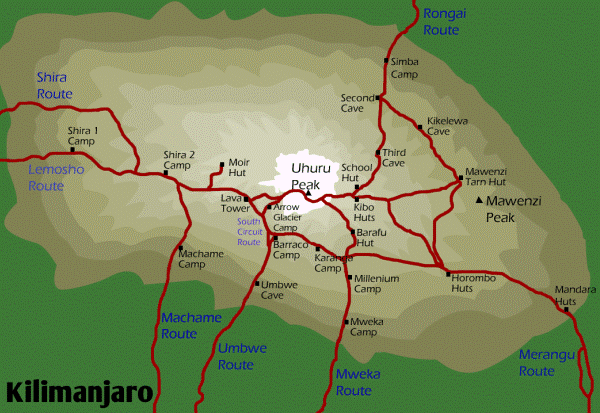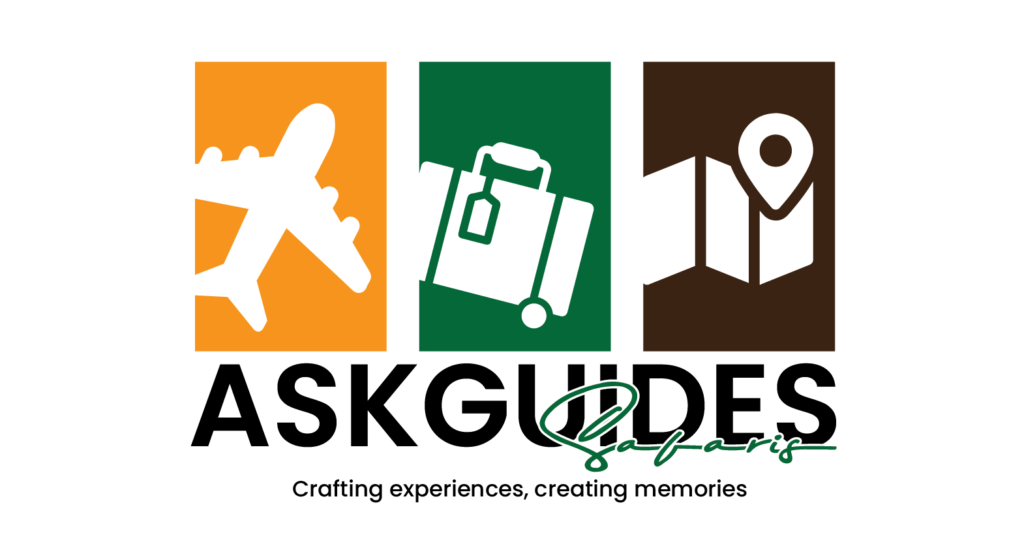Arrival at Kilimanjaro International Airport (JRO), where you will meet Kiliholidays representative, and transfer to Weru Weru River lodge (https://www.weruweruriverlodge.com/ ). The hotel will provide all the essentials for a comfortable stay: cozy rooms, hot water, polite staff, a swimming pool, and Internet access. In the evening there will be a briefing with our managers, who will also make sure you are ready to begin the climb. 𝐁𝐞𝐝 𝐚𝐧𝐝 𝐁𝐫𝐞𝐚𝐤𝐟𝐚𝐬𝐭 𝐍𝐨𝐭𝐞: Check-in starts at 1:00 PM.
A guide and a mountain support crew will arrive at the hotel in the morning in order to meet you and hold a quick briefing, after which you will travel by vehicle to Kilimanjaro National Park’s northern entrance: Nalemuru Gate (2,020 m). After the quick formality of acquiring climbing permits and registering with the search and rescue service, the group will start trekking up to Simba Camp (2,625 m). Your trek this day will be moderate and take you through coniferous forest up Kilimanjaro’s northern slope. Remember not to hurry and always keep a comfortable pace. By the time you reach the camp, our professional mountain crew will prepare everything necessary, put tents and cook dinner for you. This will be your first day at this altitude, so it is strongly recommended you heed the following instructions from this point on: Abstain from consuming alcohol and caffeine Drink over 4 liters of bottled water daily (little by little, frequently) Take a Diamox pill to help alleviate symptoms of altitude sickness. Most mountain climbers take Diamox in the morning, before they start their ascent, in order to reduce discomfort associated with altitude sickness. We recommend you consult your doctor prior to the trip in case of potential allergies. At night you may experience discomfort associated with acclimatization to the high altitude: because of a reduction in your waking breathing pattern, your body gets less oxygen than during the day. Taking altitude into account, you may therefore start feeling sick and have a headache. Pay attention to your own body and tell your guide if you start feeling any symptoms of altitude sickness. 𝐋𝐮𝐧𝐜𝐡; 𝐃𝐢𝐧𝐧𝐞𝐫 𝐄𝐋𝐄𝐕𝐀𝐓𝐈𝐎𝐍: 2,020 m to 2,625 m 𝐇𝐈𝐊𝐈𝐍𝐆 𝐓𝐈𝐌𝐄: 3-4 hours 𝐃𝐈𝐒𝐓𝐀𝐍𝐂𝐄: 8 km 𝐃𝐈𝐅𝐅𝐈𝐂𝐔𝐋𝐓𝐘: Low 𝐇𝐀𝐁𝐈𝐓𝐀𝐓: Rainforest
Early in the morning after breakfast, the group will depart from Simba Camp to start trekking towards your second high altitude camp: Kikilewa Camp (3,630 m) where you can see Kibo Volcano at its finest (barring cloudy weather). This trekking is more physically demanding than the previous one, so once you are in the camp, full rest is recommended. 𝐁𝐫𝐞𝐚𝐤𝐟𝐚𝐬𝐭; 𝐋𝐮𝐧𝐜𝐡; 𝐃𝐢𝐧𝐧𝐞𝐫 𝐄𝐋𝐄𝐕𝐀𝐓𝐈𝐎𝐍: 2,625 m to 3,630 m 𝐇𝐈𝐊𝐈𝐍𝐆 𝐓𝐈𝐌𝐄: 5-6 hours 𝐃𝐈𝐒𝐓𝐀𝐍𝐂𝐄: 10 km 𝐃𝐈𝐅𝐅𝐈𝐂𝐔𝐋𝐓𝐘: Medium 𝐇𝐀𝐁𝐈𝐓𝐀𝐓: Moorland
Early wakeup, breakfast and the start of trekking to Mawenzi Tarn Camp, which is situated at the foot of Mawenzi Volcano, Kilimanjaro’s second summit. When you reach the camp, you will have lunch and a two-hour rest, after which there will be an acclimatization hike towards Mawenzi Volcano with a 200- meter gain in altitude, followed by a hike back down to Mawenzi Tarn Camp, where you will have dinner in the evening. Note: The acclimatization hike is an easy trek with a slight gain in altitude done in order to speed up the acclimatization process. You should take the acclimatization hikes very seriously. They help increase your chances of successfully summiting Kilimanjaro and save you from the consequences of altitude sickness. 𝐁𝐫𝐞𝐚𝐤𝐟𝐚𝐬𝐭; 𝐋𝐮𝐧𝐜𝐡; 𝐃𝐢𝐧𝐧𝐞𝐫 𝐀𝐜𝐜𝐥𝐢𝐦𝐚𝐭𝐢𝐳𝐚𝐭𝐢𝐨𝐧 𝐡𝐢𝐤𝐞: Mawenzi Tarn Camp (4,310 m) — Destination point en route to Mawenzi Volcano (4,510 m) 𝐇𝐢𝐤𝐢𝐧𝐠 𝐝𝐢𝐬𝐭𝐚𝐧𝐜𝐞: 𝟐 𝐤𝐦 𝐇𝐢𝐤𝐢𝐧𝐠 𝐭𝐢𝐦𝐞: 𝟏–𝟐 𝐡𝐨𝐮𝐫𝐬. 𝐄𝐋𝐄𝐕𝐀𝐓𝐈𝐎𝐍: 𝟑,𝟔𝟑𝟎 𝐦 𝐭𝐨 𝟒,𝟑𝟏𝟎 𝐦 𝐇𝐈𝐊𝐈𝐍𝐆 𝐓𝐈𝐌𝐄: 𝟒-𝟓 𝐡𝐨𝐮𝐫𝐬 𝐃𝐈𝐒𝐓𝐀𝐍𝐂𝐄: 𝟔 𝐤𝐦 𝐃𝐈𝐅𝐅𝐈𝐂𝐔𝐋𝐓𝐘: 𝐌𝐞𝐝𝐢𝐮𝐦 𝐇𝐀𝐁𝐈𝐓𝐀𝐓: 𝐌𝐨𝐨𝐫𝐥𝐚𝐧𝐝
This day will be spent trekking towards School Hut Camp (4,715 m). The landscape will change significantly to give way to a rocky semidesert. The actual trekking is not very difficult; just remember to stick with an appropriate pace to keep up your strength for the trekking to Kilimanjaro’s summit. When you reach the camp, we recommend you sleep well, avoid strenuous activity, and drink as much as you can, because that very night you will be ascending Uhuru Peak (5,895 m). 𝐁𝐫𝐞𝐚𝐤𝐟𝐚𝐬𝐭; 𝐋𝐮𝐧𝐜𝐡; 𝐃𝐢𝐧𝐧𝐞𝐫 𝐄𝐋𝐄𝐕𝐀𝐓𝐈𝐎𝐍: 𝟒,𝟑𝟏𝟎 𝐦 𝐭𝐨 𝟒,𝟕𝟏𝟓 𝐦 𝐇𝐈𝐊𝐈𝐍𝐆 𝐓𝐈𝐌𝐄: 𝟓-𝟔 𝐡𝐨𝐮𝐫𝐬 𝐃𝐈𝐒𝐓𝐀𝐍𝐂𝐄: 𝟗 𝐤𝐦 𝐃𝐈𝐅𝐅𝐈𝐂𝐔𝐋𝐓𝐘: 𝐌𝐞𝐝𝐢𝐮𝐦 𝐇𝐀𝐁𝐈𝐓𝐀𝐓: 𝐀𝐥𝐩𝐢𝐧𝐞 𝐝𝐞𝐬𝐞𝐫𝐭
Night departure from School Hut Camp (4,715 m) and the start of your trekking to Kilimanjaro’s summit: Uhuru peak (5,895 m). The trekking will be moderate from a physical standpoint, but the altitude presents a much more serious problem. For the entire length of the trekking each pair of climbers will be accompanied by their own guide, who will be monitoring your stamina and mental resolve. After your successful ascent to Uhuru Peak, you can descend to the nearest glacier if desired. Then you will return to Kibo Camp and after a two-hour rest continue your descent to School Hut Camp (3,720 m). 𝐍𝐨𝐭𝐞: Don’t forget that 90% of all accidents occur during the descent, including all broken arms and legs. Please pay attention to your feet, as there is a high risk of damaging your toenails.𝐁𝐫𝐞𝐚𝐤𝐟𝐚𝐬𝐭; 𝐋𝐮𝐧𝐜𝐡; 𝐃𝐢𝐧𝐧𝐞𝐫 𝐄𝐋𝐄𝐕𝐀𝐓𝐈𝐎𝐍 𝟒,𝟕𝟏𝟓 𝐦 𝐭𝐨 𝟓,𝟖𝟗𝟓 𝐦 𝟓,𝟖𝟗𝟓 𝐦 𝐭𝐨 𝟑,𝟕𝟐𝟎 𝐦 𝐇𝐈𝐊𝐈𝐍𝐆 𝐓𝐈𝐌𝐄: 𝟏𝟐-𝟏𝟒 𝐡𝐨𝐮𝐫𝐬 𝐃𝐈𝐒𝐓𝐀𝐍𝐂𝐄: 𝟐𝟏 𝐤𝐦 𝐃𝐈𝐅𝐅𝐈𝐂𝐔𝐋𝐓𝐘: 𝐇𝐢𝐠𝐡 𝐇𝐀𝐁𝐈𝐓𝐀𝐓: 𝐀𝐫𝐜𝐭𝐢𝐜
You will be offered a warm breakfast in the morning, after which we will head for the Kilimanjaro National Park’s exit: Marangu Gate (1,860 m). After your descent the whole group will gather to congratulate you, and then you will have the chance to share your opinions on the trip in the guestbook. Lastly, we will present you with your commemorative certificates and provide you a transfer back to the 𝐖𝐞𝐫𝐮 𝐖𝐞𝐫𝐮 𝐥𝐨𝐝𝐠𝐞 𝐨𝐫 𝐒𝐢𝐦𝐢𝐥𝐚𝐫. 𝐁𝐫𝐞𝐚𝐤𝐟𝐚𝐬𝐭; 𝐋𝐮𝐧𝐜𝐡 𝐄𝐋𝐄𝐕𝐀𝐓𝐈𝐎𝐍: 𝟑,𝟖𝟐𝟎 𝐦 𝐭𝐨 𝟏,𝟔𝟒𝟎 𝐦 𝐇𝐈𝐊𝐈𝐍𝐆 𝐓𝐈𝐌𝐄: 𝟒-𝟓 𝐡𝐨𝐮𝐫𝐬 𝐃𝐈𝐒𝐓𝐀𝐍𝐂𝐄: 𝟏𝟐 𝐤𝐦 𝐃𝐈𝐅𝐅𝐈𝐂𝐔𝐋𝐓𝐘: 𝐋𝐨𝐰 𝐇𝐀𝐁𝐈𝐓𝐀𝐓: 𝐑𝐚𝐢𝐧𝐟𝐨𝐫𝐞𝐬𝐭
Rest in the hotel and transfer to the airport. Breakfast 𝐍𝐨𝐭𝐞: Hotel check-out is at 11:00 AM. In case you need a late check-out because of an evening flight, there is the option to extend your hotel stay for an extra fee.
Included
Transfers:
- Pick-up and drop-off at Kilimanjaro International Airport;
- Transfer to the trailhead – entry gate to Kilimanjaro National Park;
- Pick-up at the exit from Kilimanjaro National Park and transfer to the hotel;
𝙀𝙣𝙩𝙧𝙮 𝙛𝙚𝙚𝙨:
- All park fees collected by the Kilimanjaro National Park (conservation fees, camping fees, crew fees, vehicle fee, rescue fee and all other fees collected by the Tanzania National Parks Authority).
𝘼𝙘𝙘𝙤𝙢𝙢𝙤𝙙𝙖𝙩𝙞𝙤𝙣:
- One night at 3* hotel (Weru Weru River Lodge or Similar) before the expedition and one night after; The hotels have everything for your comfortable stay – caring staff, nice rooms, reliable Wi-Fi, restaurant and swimming pool);
- Tented accommodation on Mount Kilimanjaro (modern comfortable 4-season North Face VE-25 tents).
𝙋𝙡𝙚𝙖𝙨𝙚 𝙣𝙤𝙩𝙚: All accommodation is on sharing basis (i.e. you will be sharing with your travel companion a twin/double room in the hotel and a tent during the hike. If you travel alone, we will match you with a same-sex adventurer). 𝙈𝙚𝙖𝙡𝙨:
- Breakfast in the hotel before and after the hike
- All meals on the hike. Our Kilimanjaro diet includes energy-rich and highly nutritious meals prepared by our professional high-altitude cooks. A typical diet on Kilimanjaro includes different soups, garnishes, several types of fish and meat, fresh fruit and vegetables; vegetarian/gluten- free/halal options are available at no extra cost;
- All drinks on the hike (coffee, tea, hot chocolate and water).
𝐇𝐢𝐤𝐢𝐧𝐠 𝐚𝐧𝐝 𝐬𝐚𝐟𝐞𝐭𝐲 𝐞𝐪𝐮𝐢𝐩𝐦𝐞𝐧𝐭:
- 4-inch (10-cm) thick and comfortable sleeping mats;
- All group equipment (spacious and comfortable dining tent, camping table and chairs, crockery and cutlery);
- Oxygen cylinders and oximeters;
- Complete medical kits.
- Climbing crew:
- Professional guides, licensed by Kilimanjaro National Park. All our guides are the holder of Wilderness First Responder or Wilderness First Aid certifications. All our guides have 10+years of successful mountaineering experience;
- Dedicated support crew (assistant guides, camp master, porters, cooks, etc.).
Excluded
- Airline tickets;
- Alcoholic and soft drinks
- Visa fees
- Tips
- Personal spending money for souvenirs etc.
- Travel insurance
- Personal gear rentals;
𝐓𝐢𝐩𝐩𝐢𝐧𝐠 𝐨𝐧 𝐊𝐢𝐥𝐢𝐦𝐚𝐧𝐣𝐚𝐫𝐨 𝐢𝐬 𝐚𝐧 𝐞𝐬𝐬𝐞𝐧𝐭𝐢𝐚𝐥 𝐚𝐧𝐝 𝐜𝐮𝐬𝐭𝐨𝐦𝐚𝐫𝐲 𝐰𝐚𝐲 𝐨𝐟 𝐭𝐡𝐚𝐧𝐤𝐢𝐧𝐠 𝐲𝐨𝐮𝐫 𝐦𝐨𝐮𝐧𝐭𝐚𝐢𝐧 𝐜𝐫𝐞𝐰 𝐟𝐨𝐫 𝐚𝐥𝐥 𝐨𝐟 𝐭𝐡𝐞𝐢𝐫 𝐡𝐚𝐫𝐝 𝐰𝐨𝐫𝐤. 𝐀𝐧𝐝 𝐦𝐚𝐧 𝐝𝐨 𝐭𝐡𝐞𝐲 𝐰𝐨𝐫𝐤 𝐡𝐚𝐫𝐝!! 𝐀 𝐠𝐨𝐨𝐝 𝐫𝐮𝐥𝐞 𝐨𝐟 𝐭𝐡𝐮𝐦𝐛: 𝐩𝐥𝐚𝐧 𝐭𝐨 𝐭𝐢𝐩 𝐚𝐫𝐨𝐮𝐧𝐝 𝟏𝟎% 𝐨𝐟 𝐲𝐨𝐮𝐫 𝐜𝐥𝐢𝐦𝐛 𝐩𝐫𝐢𝐜𝐞. 𝐋𝐞𝐚𝐝 𝐠𝐮𝐢𝐝𝐞: $𝟐𝟎-$𝟑𝟎 𝐩𝐞𝐫 𝐝𝐚𝐲 𝐀𝐬𝐬𝐢𝐬𝐭𝐚𝐧𝐭 𝐠𝐮𝐢𝐝𝐞𝐬: $𝟏𝟓-$𝟐𝟓 𝐩𝐞𝐫 𝐝𝐚𝐲 𝐂𝐨𝐨𝐤: $𝟏𝟎-$𝟏𝟓 𝐩𝐞𝐫 𝐝𝐚𝐲 𝐇𝐞𝐥𝐩𝐢𝐧𝐠 𝐩𝐨𝐫𝐭𝐞𝐫𝐬: $𝟖-$𝟏𝟐 𝐩𝐞𝐫 𝐝𝐚𝐲 * 𝐏𝐨𝐫𝐭𝐞𝐫𝐬: $𝟔-$𝟏𝟎 𝐩𝐞𝐫 𝐝𝐚𝐲

